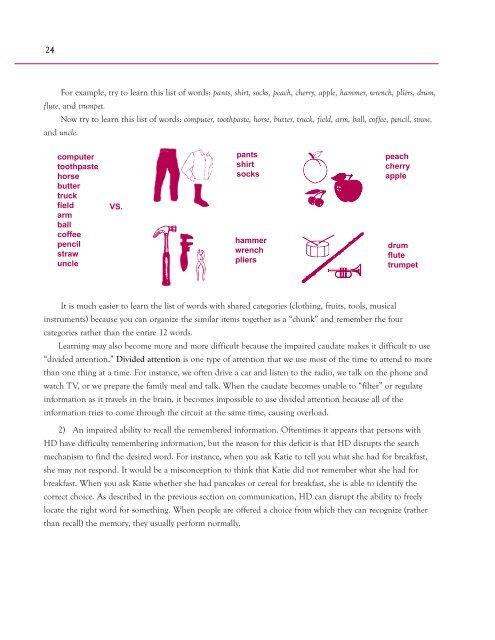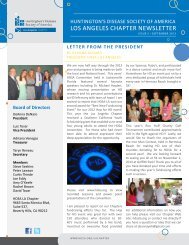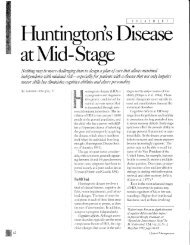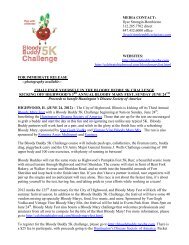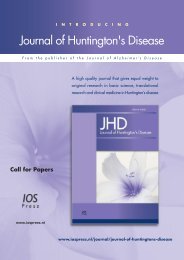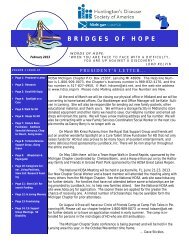Understanding Behavior in HD.final.8-18-05 - Huntington's Disease ...
Understanding Behavior in HD.final.8-18-05 - Huntington's Disease ...
Understanding Behavior in HD.final.8-18-05 - Huntington's Disease ...
You also want an ePaper? Increase the reach of your titles
YUMPU automatically turns print PDFs into web optimized ePapers that Google loves.
24<br />
For example, try to learn this list of words: pants, shirt, socks, peach, cherry, apple, hammer, wrench, pliers, drum,<br />
flute, and trumpet.<br />
Now try to learn this list of words: computer, toothpaste, horse, butter, truck, field, arm, ball, coffee, pencil, straw,<br />
and uncle.<br />
computer<br />
toothpaste<br />
horse<br />
butter<br />
truck<br />
field<br />
arm<br />
ball<br />
coffee<br />
pencil<br />
straw<br />
uncle<br />
VS.<br />
pants<br />
shirt<br />
socks<br />
hammer<br />
wrench<br />
pliers<br />
peach<br />
cherry<br />
apple<br />
drum<br />
flute<br />
trumpet<br />
It is much easier to learn the list of words with shared categories (cloth<strong>in</strong>g, fruits, tools, musical<br />
<strong>in</strong>struments) because you can organize the similar items together as a “chunk” and remember the four<br />
categories rather than the entire 12 words.<br />
Learn<strong>in</strong>g may also become more and more difficult because the impaired caudate makes it difficult to use<br />
“divided attention.” Divided attention is one type of attention that we use most of the time to attend to more<br />
than one th<strong>in</strong>g at a time. For <strong>in</strong>stance, we often drive a car and listen to the radio, we talk on the phone and<br />
watch TV, or we prepare the family meal and talk. When the caudate becomes unable to “filter” or regulate<br />
<strong>in</strong>formation as it travels <strong>in</strong> the bra<strong>in</strong>, it becomes impossible to use divided attention because all of the<br />
<strong>in</strong>formation tries to come through the circuit at the same time, caus<strong>in</strong>g overload.<br />
2) An impaired ability to recall the remembered <strong>in</strong>formation. Oftentimes it appears that persons with<br />
<strong>HD</strong> have difficulty remember<strong>in</strong>g <strong>in</strong>formation, but the reason for this deficit is that <strong>HD</strong> disrupts the search<br />
mechanism to f<strong>in</strong>d the desired word. For <strong>in</strong>stance, when you ask Katie to tell you what she had for breakfast,<br />
she may not respond. It would be a misconception to th<strong>in</strong>k that Katie did not remember what she had for<br />
breakfast. When you ask Katie whether she had pancakes or cereal for breakfast, she is able to identify the<br />
correct choice. As described <strong>in</strong> the previous section on communication, <strong>HD</strong> can disrupt the ability to freely<br />
locate the right word for someth<strong>in</strong>g. When people are offered a choice from which they can recognize (rather<br />
than recall) the memory, they usually perform normally.


